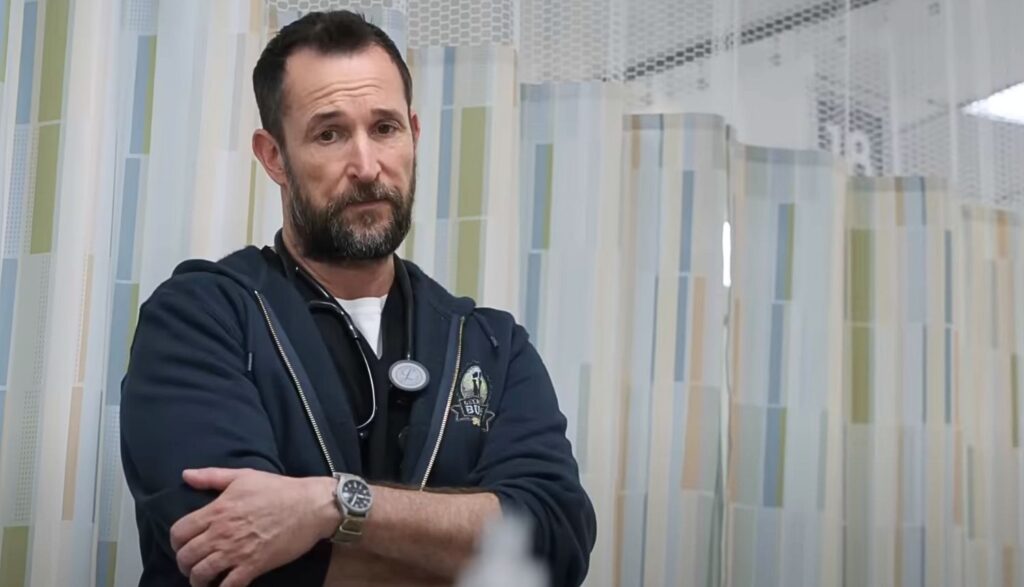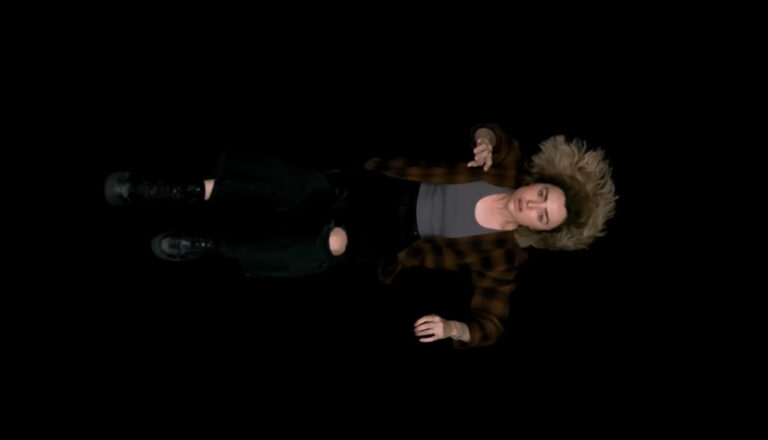
The ‘Burbs
‘The ‘Burbs’ is Peacock’s attempt to adapt the 1989 movie of the same name. But a fresh coat of paint doesn’t hide the content issues.

When Dr. Michael “Robby” Robinavitch walks into the ER, it only takes a single look around the crowded waiting room to know it’ll be a long day.
Sure, the emergency room at Pittsburgh Trauma Medical Hospital is always really crowded. To be seen within eight hours is a blessing there. But there are other signs of busyness, too: The medical students and interns are starting today, for instance. And there goes a naked man running down the hall, screaming something about “no more needles.”
“You sure you want to work today, huh?” Dr. Abbot jokes.
But Robby doesn’t want to work today. He hasn’t worked this day in four years—not since his mentor, Dr. Adamson, died. It was a terrible day, those four years ago, when COVID left the ER—known affectionately as the Pitt—scrambling.
And Robby has a feeling that today is going to be just as bad.
That feeling turns out to be pretty accurate; the day is filled with tragedies, from treating victims of a mass shooting to breaking the news of a child’s death to her sister.
Such events might have caused someone else to throw in the towel; Robby just drank a beer and called it a day.
Months later, in Season 2, a lot has changed: The resident doctors are now well in the swing of things, and some new faces have been brought on, too. And Robby’s now just one shift away from a three-month sabbatical. But during his leave, he’ll be temporarily replaced by Dr. Baran Al-Hashimi, whose style of leadership is already starting to get on Robby’s nerves.
Still, compared to that terrible day months earlier, things are relatively calm.
But the shift has only just begun; there’s still plenty of time for Robby to earn that sabbatical.
“This is the job that keeps on giving,” Robby quips, “nightmares, ulcers, suicidal tendencies.”
Robby says it with sad sarcasm, but we see some of the very nightmares he references.
Each season of HBO Max’s The Pitt brings us into a single shift at the fictional Pittsburgh Trauma Medical Hospital. Each of the episodes covers roughly one hour of that shift, 24–style. And comparing how those episodes stack up against the typical 12-hour hospital shift, you can guess that things get rather hectic.
But the show gained a quick audience for its unflinching approach to the medical sphere. Sure, we’ve had plenty of medical dramas in the past (including, of course, star Noah Wyle’s very own iconic role in ER, perhaps the granddaddy of them all), but those shows usually focus far more on doctor-on-doctor romance, playing fast and loose with hospital procedures for the sake of intense narratives. The Pitt, in contrast, sticks to hospital protocol. Perhaps that’s why it’s often referenced as one of the most realistic medical dramas of all time.
But that’s where things take a turn for us, content-wise. Because in striving for accuracy, The Pitt gives us a close-up view of many operations and injuries that’ll churn a stomach or two. For example, in the first episode, we see a woman suffering from a degloved leg (when the skin and tissue is peeled away from the muscle underneath). We see others succumb to their maladies, including a young child. And blood is near constant.
Likewise, given that nudity is a medical reality within hospitals, the show doesn’t hide it, either: some patients require their clothes removed to receive care, meaning we see men and women fully naked. We see an insane man’s anatomy as doctors attempt to sedate him. And in one episode, nothing is hidden from the camera as we watch as a woman give birth. While it’s important to note that none of this nudity is sexualized, its presence still merits viewer consideration regardless. We also meet two gay men who are using a woman for a surrogate pregnancy.
Hospital staff likewise have to handle a wide variety of other difficult topics, too, such as: a 17-year-old girl seeking mifepristone and misoprostol for a chemical abortion (which she unfortunately obtains and ingests); a trans person whom hospital staff must apologize to for “misgendering”; a drug overdose; a miscarriage; the death of a 6-year-old girl; child abuse; a boy with suicidal thoughts and a boy who wishes to kill his classmates; and mass shooting victims.
And, yes, as you may expect at this point, crude language is frequent, too, each episode administering hefty doses of the f-word, among other profanities.
In other words, The Pitt comes across extremely realistic. But if you want realism in a hospital setting, don’t expect anything to be sanitized.
(Editor’s Note: Plugged In is rarely able to watch every episode of a given series for review. As such, there’s always a chance that you might see a problem that we didn’t. If you notice content that you feel should be included in our review, send us an email at letters@pluggedin.com, or contact us via Facebook or Instagram, and be sure to let us know the episode number, title and season so that we can check it out.)
Robby’s shift begins, and he immediately finds that Dr. Al-Hashimi’s leadership style clashes with his own.
A Roman Catholic woman calls on Jesus, fearing that she is going to die. She says she needs a priest because she is convinced that she is dying and in a state of mortal sin. She recites the Hail Mary blessing and claims Jesus is coming for her. “If He is, He hasn’t checked in at registration yet,” her provider jokes.
A nun comes in with conjunctivitis. She says she’s married to God. She asks her doctor, Victoria, if she’s considered serving God—to which Victoria responds that her family is Hindu. Someone references the prodigal son. A woman wears a cross necklace. Someone jokes that Robby is using his sabbatical to go on a “spirit quest.” A nurse tells another hospital worker to place a homeless patient near the nun in the hopes that “some of her divine grace will rub off.”
When that homeless man enters the hospital, he’s covered in gunk and smells terrible. Hospital staffers give the man a shower, and we see his naked rear as he scrubs. A charge nurse expresses a desire to have sex. Someone describes a relationship as lust rather than love.
A man enters the emergency room with a stab wound to his chest. Surgeons cut open the man’s chest to operate on him, exposing his lungs and heart. We see a variety of other injuries, including skinned shins and a young girl with heavy bruises across her body. Someone who examines the girl requests a urine sample, which comes back bloody—and the provider fears the girl’s father may have sexually assaulted the girl. A plot point involves the hospital finding an abandoned newborn baby in their waiting room’s restroom. An elderly man passes away. Another patient is wheeled in with his bone sticking out of his arm.
Someone admits to having an addiction to anti-anxiety medication and using his patients’ prescriptions to steal some drugs for himself. A man, suffering from issues exacerbated by his heavy drinking, mentions wanting another drink. Someone expresses a desire to self-medicate with pain killers and alcohol. An elderly woman says she uses marijuana to alleviate her pain.
We hear three uses of the f-word and two instances of the s-word. We also hear “b–ch,” “d–n” and “h—.” God’s name is used in vain three times, and Jesus’ name is likewise used in vain once. Someone references male genitals.
With patient influx slowly coming back under control, Robby and his team begin to clock out of their shifts—and to process the grief of the day.
A man’s genitals are visible as doctors begin operating on his pelvis. We see another man shirtless.
Blankets cover the dead bodies of six shooting victims. A teen admits to attempting suicide. We hear about a girl who committed suicide due to the trauma of being sexually assaulted. A man suffers from a crushed pelvis after being pinned by a truck. We see an incision made with a scalpel. A teen awaits care for a fork that’s been stuck through her nose.
A doctor gets accused of abusing drugs. A woman smokes a cigarette. People drink beer, and they allow an underaged woman to drink with them.
Someone describes a shift as “baptism by fire.” A woman asks if someone is a “religious freak.”
We hear the f-word roughly 25 times, including one instance that’s paired with “mother.” We hear the s-word nine times. We also hear a crude word for female genitalia once. “A–,” “d–n,” “h—” and “p-ss” are also used. God’s name is used in vain three times, including one instance paired with “d–n.” Jesus’ name is likewise abused once.
Robby starts his shift at Pittsburgh Trauma Medical Hospital. Meanwhile, the new staff medical students adjust to the chaotic life of the ER.
We see a patient’s naked rear as he runs down a hall. Doctors cut off a woman’s bra during an operation, and we see her breasts. A shirtless man is defibrillated.
A woman screams in agony as she’s wheeled in with a degloved leg, and we see the muscle tissue and bone on what’s left of it. Later, someone snaps the leg back into a proper position. Another woman suffers from severe burns on her hand. A man recovers from a gunshot wound to the shoulder. And another patient receives care for bruises on his face. A man receives stitches on his head, from which ample blood pumps. An elderly woman passes away. We hear a reference to a teen coming in to receive pills for a chemical abortion later in the day. A woman warns a doctor that her son threatened to kill his classmates.
We’re told that a man survived having a blood alcohol content of .42. Doctors discover that an unconscious young boy unknowingly ingested his father’s marijuana gummies.
A doctor crosses herself. A woman vomits. A medical student accidentally walks in on a patient as they’re defecating due to an enema, and we can see some of the brown stains. A medical student jokes about defecating herself.
We hear the f-word and s-word six times each. We also hear many uses of “a–,” “d–n” and “h—.” God’s name is used in vain once, and Jesus’ name is likewise used in vain twice.

Kennedy Unthank studied journalism at the University of Missouri. He knew he wanted to write for a living when he won a contest for “best fantasy story” while in the 4th grade. What he didn’t know at the time, however, was that he was the only person to submit a story. Regardless, the seed was planted. Kennedy collects and plays board games in his free time, and he loves to talk about biblical apologetics. He’s also an avid cook. He thinks the ending of Lost “wasn’t that bad.”

‘The ‘Burbs’ is Peacock’s attempt to adapt the 1989 movie of the same name. But a fresh coat of paint doesn’t hide the content issues.

Don’t be fooled by the show’s teenage characters. Parents would be advised not to let their own teens be haunted by its content.

‘Drops of God’ focuses on a wine-centric competition, and it comes with notes of sexual content and some crude language, too.

Apple TV+ welcomes preschoolers to Yo Gabba GabbaLand—though parents may want to note the show’s references to magic.